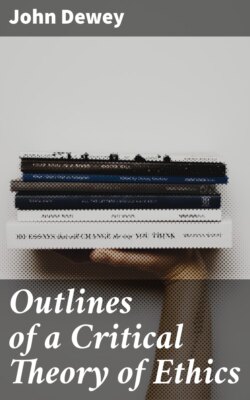Читать книгу Outlines of a Critical Theory of Ethics - Джон Дьюи - Страница 16
На сайте Литреса книга снята с продажи.
X.
ОглавлениеHedonism.
According to the strict hedonistic position, the pleasure resulting to the agent from his act is the end of conduct and is therefore the criterion of its morality. The position as usually taken involves, first, that pleasure is psychologically the sole motive to action; and, secondly, that the results of an act in the way of the pain or pleasure it produces are the only tests we have of the rightness of the act.
It is said above that these two points are involved in the hedonistic position as usually taken. They are not necessarily involved.
Sidgwick (Methods of Ethics, Bk. I, ch. IV and Bk. IV, ch. I) holds that pleasure is not the object of desire or motive of action, but that happiness is the moral end and criterion. On the other hand Hodgson (Theory of Practice, Vol. II, ch. II) holds that pleasure may be the motive (in the sense of impelling force) but it is never the criterion of conduct. Kant adopts the psychology of hedonism regarding pleasure as the object of desire, but holds that on that very account no object of desire can be the standard of moral conduct.
A good statement of strict individualistic hedonism is the following from Barratt, Physical Ethics, page 71: "If man aims at pleasure merely by the physical law of action, that pleasure must evidently be ultimately his own, and whether it be or not preceded by phenomena which he calls the pain and pleasure of others, is a question not of principle but of detail, just as the force of a pound weight is unaltered whether it be composed of lead or of feathers, or whether it act directly or through pulleys."
